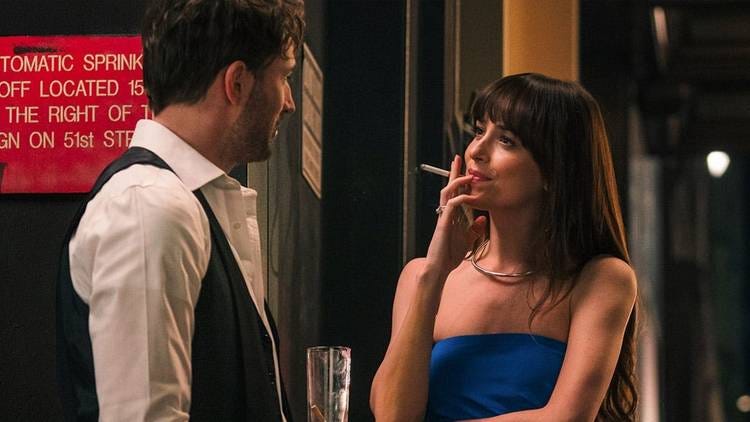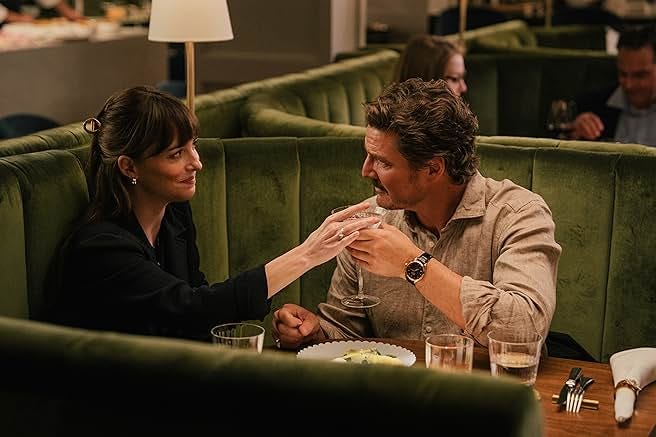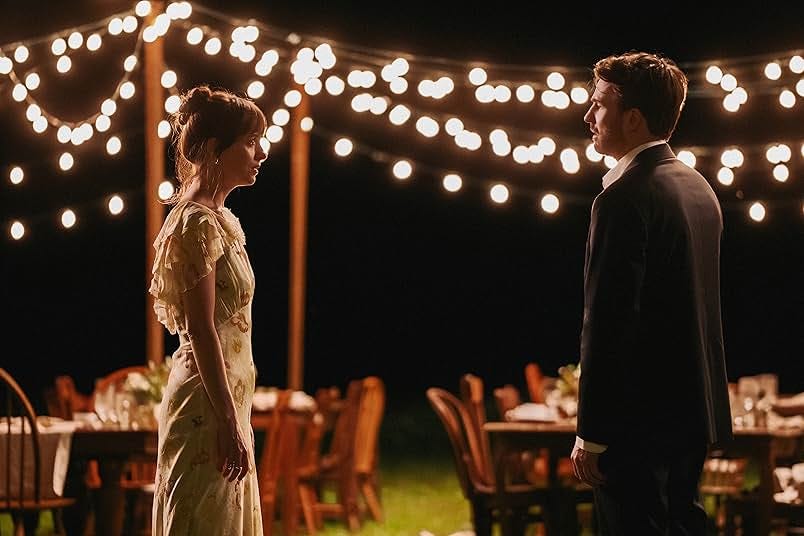Immaterial
"Materialists" is a rom-com with all the romance of a Dollar Tree Valentine's Day Card

For all it has to say about love, there is little romance to be found in Materialists, the sophomore effort of writer and director Celine Song. In her debut film, Past Lives, the climax of two people waiting for a taxi moved me to tears. When Materialists ends on a marriage proposal in Central Park, the closest thing to an emotion I could muster was a shrug.
Dakota Johnson plays Lucy, a matchmaker for the elite singles of New York. She’s good at what she does, but for her own love life, she claims to be “voluntarily celibate.” That is until she meets, Harry (Pedro Pascal), a charming financier, in Lucy’s business he’s known as a “Unicorn” — an impossible fantasy — i.e.: rich, tall, and emotionally intelligent. He owns a $12,000,000 city penthouse, too. Simultaneously, she also reconnects with her ex-boyfriend, John (Chris Evans), a struggling actor with a crappy apartment he splits with his roommates for $850 a month.

The central question of Song’s script is what will Lucy choose: Money and stability or love and uncertainty? The problem is that for Lucy, the answer is obviously the former. She isn’t greedy or a social climber, but a realist. Through exposition we learn that she grew up in a household where concerns about money were a constant source of strife. So, it’s understandable why she would see wealth as an essential requirement for a relationship, and in the year 2025, she isn’t wrong, especially living in the city.
But Lucy does genuinely want to help her clients find their soulmates. She, and the company she works for, Adore, promise a human touch, but the process doesn’t seem much different from the algorithms of dating apps. The most illuminating scenes are the montages of her interviews with potential clients, asking about their preferred traits in a partner, their non-negotiables, and especially their financial preferences. These are also where Song’s script finds most of its comedic moments. It’s a good set-up, but a lot of the humor of it feels trite, stuck in the “battle of the sexes” comedic style you’d expect from 90’s and early 00’s comedies. The women are mostly looking for height and deep pockets, while the men only seem to care about body type and age. In Past Lives, Song presented these kinds of flaws in her subjects with empathy, here, they’re treated as punchlines that exist only to inform Lucy’s journey.
Also dated are the kinds of relationships the film shows us. Lucy and her company seem to deal exclusively in monogamy, and the only LGBTQ+ representation is in one of those before mentioned interviews with a conservative lesbian. This limited scope results in a film that feels, at times, conservative — an odd choice, especially for a movie set in New York.

The characters themselves are fairly shallow as well. They lack the rich interior lives that might indicate why they would fall in love with each other. Lucy always seems to be in salesman mode, which is good for Dakota Johnson, because her acting style always feels inauthentic to some degree. Pedro Pascal is charming but feels like he’s mostly coasting. Chris Evans is miscast as a starving artist who always wears his heart on his sleeve, not just because whenever I look at him, I think of his work in the MCU. Evans can be very funny and charming, but as John he rarely gets to show that side of himself and spends of the film either solemn or angry.
Because all we know about Lucy is that she doesn’t want to have to worry about money, it only makes sense for her to end up with Harry. They are both realists who treat relationships like corporate mergers. I have no idea why she ever even went out with John in the first place. We get a brief flashback of them arguing over $40 for parking in the middle of a Times Square traffic jam, so we get why their relationship ended the first time, but it probably would have been useful to have one that showed them in happier days, or maybe they could have replaced that 2001: A Space Odyssey opening homage with an earlier flashback to when they first met, then we could skip ahead, and it would have created a compelling mystery for what happened to break them up.
That may have helped make more sense for an ending where — yes, I’m going to spoil it — she chooses John. Before that in the scene where she breaks up with Harry, the movie must do a lot of mental gymnastics to make Lucy’s decision make sense, and in the end, it all basically boils down to she’s just not in love with him. I think what Song is trying to get at is that there is an intangible nature as to who, how, and why we love who we do that cannot be easily defined. I agree to an extent, but I also think there are clear and very conceivable reasons why people are attracted to one and other. Her relationship with Harry may be based in materialism, but at least it has a foundation.

Making matters worse, around the time she and John are supposed to be reconnecting romantically, the movie introduces a subplot in which Lucy learns that one of her clients has been sexually assaulted on a date she helped set up. It’s well intentioned, but you cannot put that kind of thing in your movie and then expect to us later to swoon when John tells Lucy about the future he envisions with her. All I could think about was that poor woman back in the city. What do I care if she picks John? The climax involves her staying over at the woman’s house to protect her from another attack. We then cut to a scene in Central Park where John is bringing her flowers and proposes. It feels tone deaf rather than cathartic.
So the movie must rely on its aesthetics to sell its romance. It is a very handsome film, well photographed with on-location shots of the city. The visual design calls to mind the work of the late-great Nora Ephron and Norman Jewison. The costuming is also quite stunning, especially for Johnson and Evans.
The screenplay does occasionally have a witty line or observation, but I can’t say I agree with the film’s conclusion that seems to imply that it’s either love or safety, take your pick. I think it’s more complicated than that, but hey, what do I know? I’m still using Bumble.



